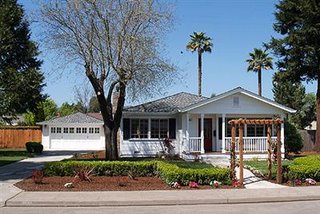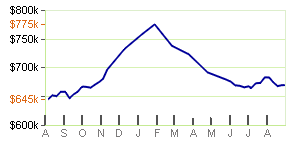 ...The Exact Nature Of Your Financial Folly, and Fraud.
...The Exact Nature Of Your Financial Folly, and Fraud.
"
Mortgage fraud became so rampant in Atlanta that the police department opened a Mortgage Fraud Unit. The unit is working on 49 open cases and recently closed one involving both a mother and son. "If you're involved in mortgage fraud, thinking

about getting involved in mortgage fraud and it's here in the city of Atlanta, we're gonna come after you. We're gonna put you in jail. We don't care who you are. We don't care if you're working it with your momma. Like Mr. Hardy here, we'll put you and your momma in jail," said Sgt. Terry Joyner of the Atlanta Police Department."
"A federal prison guard and a state parole officer are among five people arrested as part of an elaborate mortgage fraud scheme in Atlanta, officials announced on Friday. Investigators said the five suspects devised a scheme to buy a house, use fraudulent means to inflate the value of the house, and then borrow money based on the inflated value."
According to police, the scheme involved the following suspects:
The buyer: 27-year-old Quentin Chandler, a recent parolee from the state corrections system.
The realtor: 25-year-old Takeisha Randolph, Chandler's girlfriend.
The sellers: 44-year-old Michael Turner, Chandler's parole officer, and 45-year-old Duane Timmons, a federal prison guard.
The loan officer: 42-year-old Royce Odor.
"All five suspects were arrested and charged under the state Mortgage Fraud statute. Their cases will be prosecuted by the Fulton County District Attorney Office."
Did you know?"Despite being in the U.S. illegally,
undocumented immigrants can legally buy a house.
Certain lenders don't ask for immigration papers. And buyers using a special tax ID often don't need a lengthy credit history."
"That has allowed many undocumented workers to realize the American Dream, experts said, while contributing to an upturn in the real estate market."
'"The real estate companies are focusing on the nontraditional buyers. Things are slowing down, and the focus has shifted to the Hispanic home buyer because of their numbers," Houston real estate consultant Oscar Gonzalez said."
"According to the U.S. Census Bureau, 48 percent of the more than 40 million Hispanics in this country were homeowners in 2002, the last year for which such figures are available."
"Although some anti-immigration groups claim that those in the country illegally pose an economic burden, a study by the National Association of Hispanic Real Estate Professionals said that home purchases by undocumented workers could result in $60 billion in mortgages over the next few years."
"The total value of mortgages granted for home purchases in 2005 was $1.5 trillion, according to the Mortgage Bankers Association in Washington, D.C."
"Estimates on the number of illegal immigrants in the U.S. vary. The U.S. Census Bureau puts the figure at 11 million."
"For Jorge and Maribel, a couple from Mexico who have lived illegally in Houston since 1996, an Individual Tax Identification Number, known as an ITIN, and a Texas driver's license were enough to secure their mortgage, allowing them to purchase a home in 2002."
'"I was really surprised when I found out that it could be done," said Jorge, who bought his home through Gloria Castrejon's realty firm, La Palma."
"Like Maribel, Jorge asked to be identified by only his first name."
"The fact is, it can be easier for many undocumented immigrants to buy houses than to get jobs.
To complete the purchase, they don't need a Social Security number."
"An ITIN, their last two yearly tax returns, an official ID such as a consular registration card and a few credit references, such as electricity and telephone bills, are enough to apply for a mortgage and buy a home, according to experts."
'"Residency has never been a condition to purchase a home," said Frances Martinez Myers, president of the National Association of Hispanic Real Estate Professionals, which is based in Washington, D.C."
"Being in the country legally or not is not an issue when you are buying a house."
"If a buyer does provide a Social Security number, real estate agencies and lenders may request proof of legal status, according to Myers. But that is usually not the case with an ITIN."
'"It is not illegal for an undocumented immigrant to buy a house. What is illegal is to do so using a false Social Security number," Houston immigration lawyer Jose Vega warned."
"Although real estate deals involving non-U.S. residents have been going on for a while, Myers said that banks have only recently begun processing mortgages with ITIN numbers."
"Real risks For illegal immigrants, however, buying a home can carry risks."
"The biggest, said Houston real estate consultant oscar Gonzalez, of Gonzalez Group, is deportation. If homeowners are forced to leave the country, they might be unable to afford payments and, therefore, could lose their home, Myers said."
"Fraud is another risk. Paco Felici, spokesman for the Texas Attorney General's Office, said a Dallas operation that was selling homes to Hispanics without giving them property titles was busted in June. "
Put Down the Loan Application and Step Away From the Hole!
"Luisa Cordova-Holmes
was looking to lower her monthly payments when she refinanced her $312,000 mortgage in 2004. Instead, she wound up digging herself into a ditch."
"For their new loan, Ms. Cordova-Holmes and her husband chose a so-called option adjustable-rate mortgage, which carried an introductory rate of 2.35% and gave her multiple payment choices each month. "I had a lot of financial obligations," says Ms. Cordova-Holmes, an accountant who lives near Detroit."
"Two years later, however, the interest rate on her loan has jumped to 8.75%, her loan balance has climbed to $324,000 and her minimum monthly payment has risen to $2,257. She says the terms of the loan weren't clearly spelled out."
"Ms. Cordova-Holmes says she would like to refinance, but can't -- in part because her loan carries a prepayment penalty that would force her to shell out thousands of dollars if she did. Instead, she's trying to sell her home. But with Detroit's economy slumping, she hasn't been able to find a buyer. When she and her husband first put the house on the market last summer, they were asking nearly $400,000. Now they're willing to accept as little as $270,000."
"We're in a very bad situation," she says. "The payments are just killing us."
"In recent years, homeowners like Ms. Cordova-Holmes have embraced adjustable-rate mortgages -- and such variations as option ARMs, interest-only mortgages and "piggyback" loans, which, respectively, allow borrowers to make a minimum monthly payment, pay interest and no principal in the loan's early years, or finance 100% of the purchase price. The growing popularity of these products has helped fuel consumer spending, as well as double-digit home-price gains and rising homeownership rates."
"Rising mortgage rates are causing problems for first-time home buyers such as Edward Snyder, a product manager who bought his house in St. Paul, Minn., two and a half years ago. Mr. Snyder financed the $210,000 purchase with a $168,000 interest-only ARM that carried a fixed-rate of 6.15% for the first two years and a $42,000 second mortgage with a 9.4% rate that is fixed for the first three years."
"Mr. Snyder says he was stretched even before a rate adjustment on his ARM boosted his monthly payments by $200 in May. Since then, he has fallen behind on his water bills, car payments and student loan. "Now, it's a choice of what gets paid late," Mr. Snyder explains. Last month, he received a letter from his lender with the words "rate increase" on the envelope. Mr. Snyder says he hasn't opened it "because it gets too discouraging." This week, he's meeting with a mortgage broker to discuss his options."
"If I had been aware both loans were interest-only, I would have probably turned the loan down," says Mr. Snyder, who says that the terms of the mortgage were never properly explained to him.
"I believe this loan is built for failure. There's no means to build up equity."
"Roughly $137.5 billion in residential mortgages will face payment resets this year, with an additional $524 billion resetting over the next four years, according to a recent analysis by UBS AG that looked at loans sold to investors who buy mortgage-backed securities."
"Rising interest rates aren't a problem for most of these borrowers because they can refinance or have the cash to meet higher mortgage payments. Borrowers with troubled credit records may be able to refinance into a mortgage with a lower rate if they've been paying their bills on time."
"But other borrowers are running into trouble, in some cases because they didn't understand the risks of their mortgage or wound up at the closing table with a loan that wasn't what they expected."
"More than 30% of mortgage brokers believe their clients don't understand the mortgage product they selected, according to a recent survey by Macquarie Mortgages USA, a unit of the Macquarie Group. Other borrowers didn't leave a cash cushion to cover higher mortgage payments at a time when gasoline costs and minimum credit-card payments are also rising."
'"Often the reason somebody is put into an ARM or an interest-only loan...is because that's the only way the broker or loan officer could get them qualified," says Jordan Ash, director of the Acorn Financial Justice Center, an advocacy group that focuses on predatory lending issues. Acorn is currently negotiating with two large subprime lenders -- who deal with borrowers with blemished credit records -- about changes in underwriting standards and how to deal with borrowers whose interest rates are resetting."
"Many borrowers who run into trouble have relatively low incomes or scuffed credit records. But housing counselors say they are also hearing from a growing number of middle- and upper-middle-income borrowers who borrowed heavily to finance spending or buy a house they could barely afford. NeighborWorks Homeownership Center in Sacramento, Calif., says that 38% of the borrowers it's seen this year have "moderate or above-moderate" incomes, up from 24% last year."
"Mortgage delinquency rates hit 2.32% in the second quarter after bottoming out at 2.06% in the fourth quarter of 2005, according to an analysis by Equifax/Moody's Economy.com. The portion of adjustable-rate mortgages that were at least 90 days past due has climbed 141% in the past year, according to a recent study by Credit Suisse that looked at loans made to borrowers with good credit. That compares to a 27% rise in such delinquencies for fixed-rate mortgages."
"In Illinois, the new crop of borrowers includes people with bills for private schools, fancy cars and child care and monthly incomes of $3,500 to $10,000, says Michael van Zalingen, director of homeownership services at Neighborhood Housing Services of Chicago. Many of these borrowers took out loans that didn't require them to document their income and overstated their earnings, he adds."
"Steven Schwaber, a bankruptcy attorney in the Pasadena, Calif., area, says he's getting more calls from small-business owners who had refinanced into ARMs, tapping their equity in an effort to keep their businesses afloat. "All of the sudden their budgets are out of whack because their house payment went up by 25% or 30%," he says, at the same time fuel prices are rising. Some would have wound up filing for bankruptcy anyway, he adds, but rising interest rates have pushed others over the edge."
"Credit-counseling agencies say that in the past few months they've seen a growing number of homeowners pinched by rising mortgage payments. Neighborhood Housing Services of New York City says it has been "flooded" with calls from borrowers who took out ARMs two years ago and whose rates are now resetting for the first time. And Consumer Credit Counseling Services of Atlanta, which works with borrowers nationwide, says it has tripled its housing counseling staff in the past six months to keep up with increased demand."
"Until recently, most mortgage-payment problems were an unfortunate byproduct of major life changes, such as job loss, medical problems, divorce or a death in the family. But for the new wave of troubled borrowers, the problems stem largely, or in part, from the structure of their mortgage, housing counselors say."

"Some California brokers say they are beginning to see a return of "short sales" -- transactions in which the sales price isn't large enough to cover outstanding loans. Patti Vaughan, an agent with Assist 2 Sell in Temecula, Calif., says in recent months she has begun to get calls from borrowers looking to unload houses they can no longer afford. "They've upgraded their houses, put in a pool and bought themselves Hummers and BMWs," she says. "Now they can't get it refinanced and they can't sell."'
Quotable Quotes(from around the blogsphere) Comment by nnvmtgbrkr (at housingbubbleblog.com)"Don’t be lazy with probably the biggest investment of your life. Never, and let me reiterate never, immediately go with the broker your realtor recommends. These relationships serve each other, not you the consumer."
"If your realtor aggressively pushes a certain broker on you, then something is probably wrong. Never let a sales person at a big development tell you that they have a “preferred lender” that you must use. It stomps all over RESPA and is against the law. If they tell you that certain upgrades will be charged to you if you don’t use their lender, then threaten to turn them in."
North County Times.
“One of my pet peeves against groups who benefit from today’s obscene levels of housing prices is that they assume that everybody’s family should buy (invest in) real estate now. Who do you think is behind all this? I am blaming the following entities: city building departments, state politicians, banks, mortgage lenders and, lastly, your friendly neighborhood real estate companies.”
Palm Beach Post. “Mortgage broker David P. writes that, ‘The real issue is that there has been such an influx of new agents and new mortgage brokers with no financial sense..Foreclosures are inevitable in a climate of greediness that we’ve seen with overpriced listings.’”

“
George Hale of Bend-based WoodHill Homes, said the inventory buildup is causing him to trim his production plans this year, but he’s still bullish on the long haul. WoodHill sold about 25 percent of its homes to investors in 2005, Hale said, but those buyers ‘are pretty much gone.’”
“It’s hard to tell how sellers will react to the upwelling of inventory, Foster

noted. Some are selling because they have to sell. Others are just testing the waters at intentionally high prices, trying to see whether a buyer ‘with a bucket of money and a box of stupid’ will show up to pay too much.”
Comment by ChillintheOC
"Act 2, Stage 1 - Enter “The Lawyer”….who will quickly determine that the broker made a hefty fee(s) from the transaction….the appraiser rigged the value of the home….the RE agent was in cohoots with both….."
Comment by Anonymous:"...next time you will learn that when the UPS driver hands you their real estate agent card, and gives you investment advice... nod, smile, turn around slowly, and run ... and sell."










































